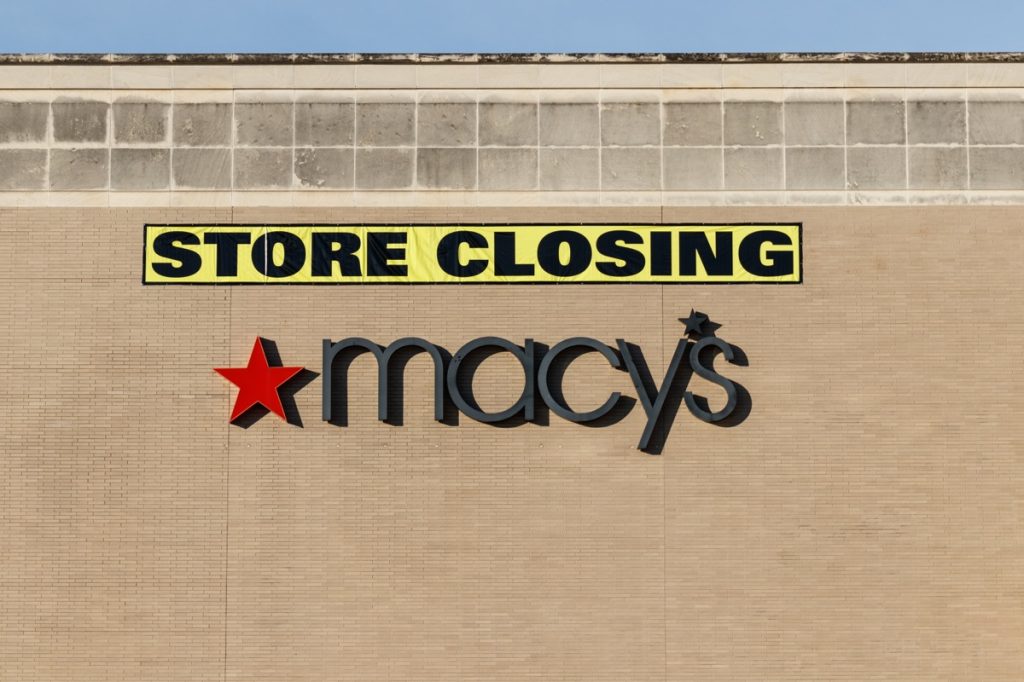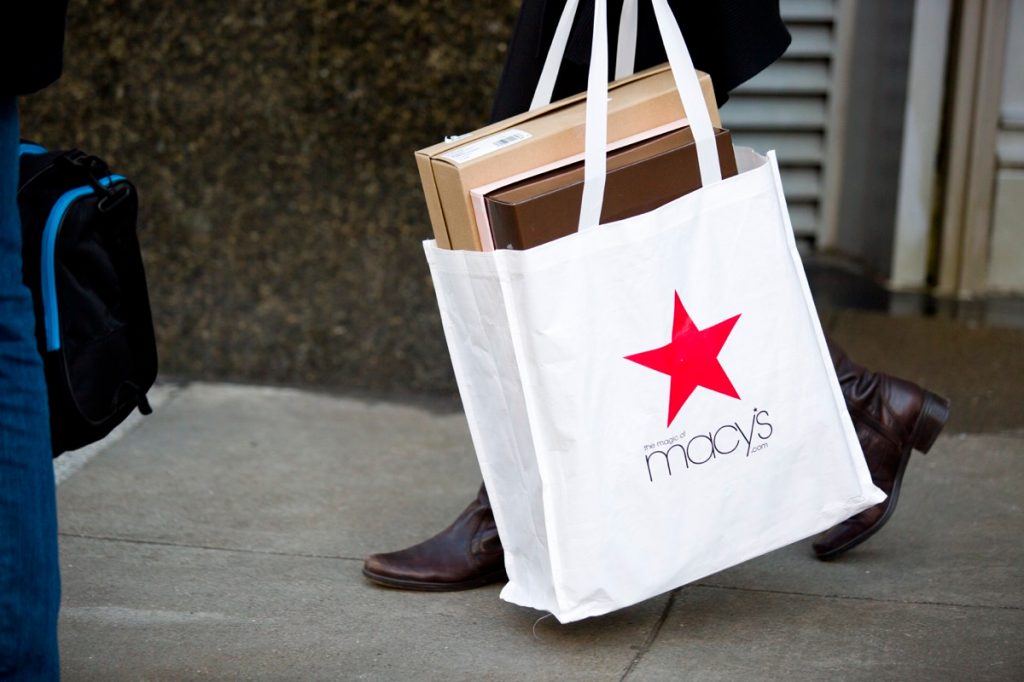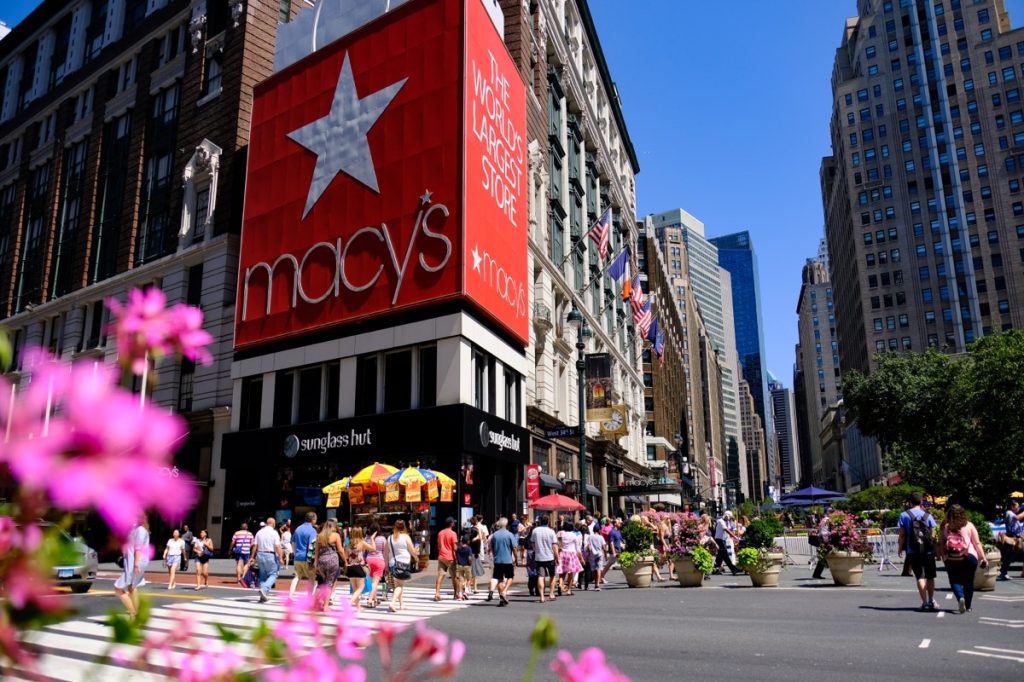Macy’s CEO Says Company Is in the “Final Stretch” of Closing Stores

In today’s treacherous retail landscape, every decision a company makes can have serious consequences for the future. Some major stores have scaled back their brick-and-mortar operations as foot traffic dwindles and more customers buy online. Others have declared bankruptcy and announced they’ll disappear entirely.
But despite experiencing its fair share of hardships, Macy’s is one player that has managed to pivot its operations on the back of a new strategy—and now, its CEO says the company is in the “final stretch” of closing stores. Read on to see what the iconic department store has planned for the near future.
READ THIS NEXT: Popular Bookstores, Including Barnes & Noble, Are Closing Locations, Starting Feb. 11.
Macy’s recently announced it was closing a handful of stores to start off the year.

Like many other major retailers, Macy’s has been no stranger to shrinking its retail footprint. In 2020, the company announced it would shutter one-fifth of all its locations by axing 125 stores over three years. While the retailer was able to delay some of the planned closings, it kicked off 2023 with the announcement that it would shutter four of its locations by the end of its first quarter sometime in late April or early May, Axios reported. Shoppers will lose one location each in California, Colorado, Hawaii, and Maryland.
The company reiterated that the move was part of its long-term plan to make itself more profitable. “As part of our Polaris transformation strategy, we continue to optimize and reposition our store fleet to ensure we have the right mix of on-mall and off-mall stores to better serve our customers and effectively support omnichannel market sales growth,” a Macy’s spokesperson previously told Best Life in a statement via email. “As a company, we are committed to offering impacted colleagues a role in nearby locations or severance packages.”
Now, the CEO of Macy’s says the company is in the “final stretch” of closing stores.

Despite the difficult decision to slim down its number of locations, it appears that the famous department store is entering the next phase of its reorganization strategy. During an on-stage appearance at the National Retail Federation’s Big Show conference in New York City, Macy’s CEO Jeff Gennette said that the company was finally winding down its streamlining process and shifting to other areas of focus that would help drive growth, Retail Dive reports.
“When you think about the Macy’s portfolio of stores, up until two and a half years ago, we were only on-mall, and we had been closing underproductive units. Since 2016 we dropped 170 stores,” Gennette told the audience. “We are in the final stretch of that.”
RELATED: For more up-to-date information, sign up for our daily newsletter.
The company says it’s focusing on smaller stores that will appeal to shoppers.

While addressing the audience, Gennette went on to explain that slimming down operating costs by dropping historically large stores is allowing the company to focus on its newer, more focused shops. “The last two years—this year and then last year…we had dramatically less square footage, because the stores that we’re opening off-mall are much smaller than the ones that are on-mall,” he said.
Gennette talked up the eight off-mall, smaller format Market By Macy’s stores the company had opened in recent years. He also mentioned the two Bloomie’s concept store locations, which will soon grow to three when another location opens this spring, Retail Dive reports.
“We’ve got a slew that are coming in the pipeline that we haven’t announced yet,” he added.
The CEO admitted he’s still “cautious” after seeing this holiday season sales figures.

But Gennette wasn’t overly optimistic during his appearance. He reiterated that recent figures showed that his company still faces plenty of potential challenges in the coming months.
“I am cautious,” he told Bloomberg reporter Caroline Hyde during an interview at the conference, per Fox Business. He pointed out that while sales “were quite strong during the November and December timeframe” of the busy holiday shopping season—including Black Friday and Cyber Monday—other weeks fell short of expectations. “Those lulls were more pronounced this year than in years past. So that is where the consumer is,” Gennette said.
However, he remained bullish about how the company’s vision for the future of its physical stores still worked in step with its online offerings. “There is just this kind of irrefutable truth that brick and mortar seeds digital activity. Customers really do want to have the option of shopping in the zip codes that they live. And where we have a store, our penetration online is significantly higher. When we close the store, it drops significantly,” Gennette explained, per Retail Dive.
He also mentioned that the past few years had given the company a chance to reconfigure its inner workings, saying the retailer had “totally redone” its supply chain, Insider reports. He cited how the store had worked with courier services such as UPS to open 35 regional warehouses to better serve customers. “We’ve put a lot of technology and a lot of capital to get this as efficient as possible, while dealing with this kind of international crisis,” Gennette told conference attendees.